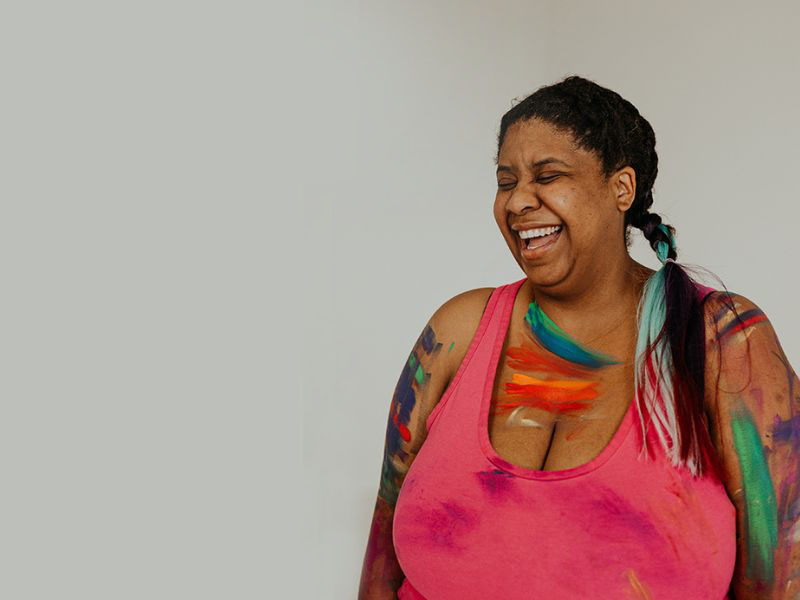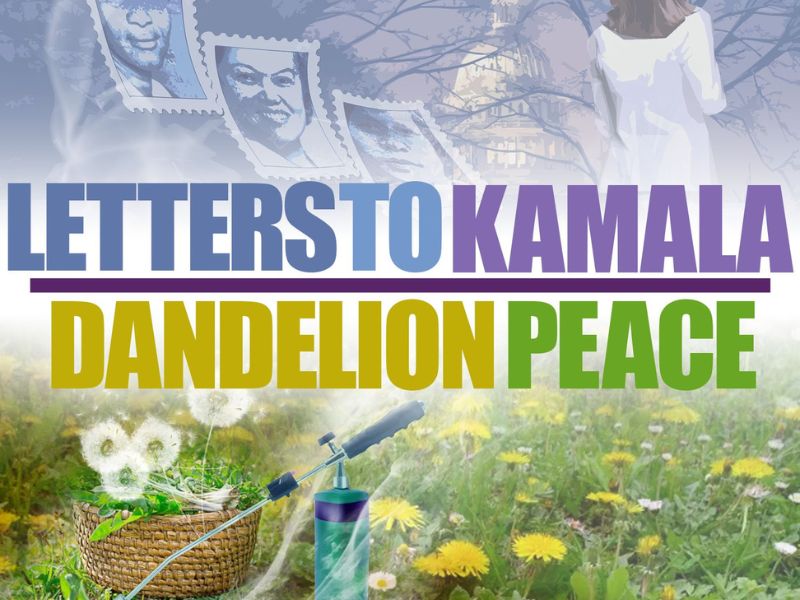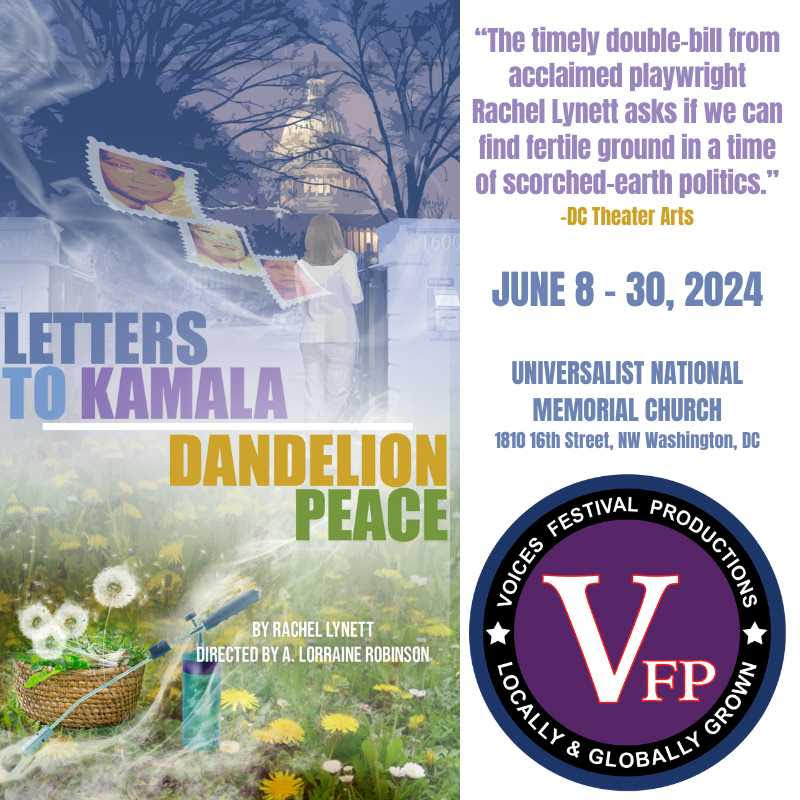Prolific playwright Rachel Lynett — winner of the 2021 Yale Drama Series Award — has a double bill of Letters to Kamala and Dandelion Peace opening June 8 and running through June 30 presented by Voices Festival Productions (VFP).
Some may have caught VFP’s 2022 reading of Lynett’s Apologies to Lorraine Hansberry (You Too, August Wilson), where her gifts were on display.
Letters to Kamala consists of imagined conversations between historical figures and the first female Vice President, who also happens to be of mixed racial heritage — African American and Asian American. Dandelion Peace shows what can happen when lines get crossed in a community garden. Described as a political farce, the piece is an allegory for these hot-tempered political times with power and collective good at stake.

I got a chance to talk with Rachel about these two works, how they came about, and why they are presented in a double bill. (Our conversation has been edited for length and clarity.)
Debbie Minter Jackson: You’ve authored so many plays over the past several years, including during the pandemic, and your works have been in festivals and performed all over the country, including the Kennedy Center in Page-to-Stage. These two plays have different themes, messages, styles, and voices. How did they come about?
Rachel Lynett: Well, for Kamala, I was commissioned by American Stage Company in 2020 in the beginning of COVID actually. Everything was shut down, we were all sequestered in our places, and they called me indicating they were looking for something dealing with aspects of the election coming up and we need some hope. It was looking bleak out there. At first, I wasn’t sure if I was the right person, my take might be a little darker than what they were going for. But we kept talking and they wanted something on Kamala Harris. Coming from California, I had mixed feelings about her being a prosecutor, knowing the damage that had been done to the Black community over the years in the legal system. A friend who is a defense attorney told me that sometimes you have to make sacrifices to get to where you want to go, but I kept wondering: at what cost?
The starting focus was Kamala Harris, so what inspired (or provoked) you to start delving into history?
As I was writing I started wondering who were the other ‘”trailblazers,” the other “firsts,” and what did they have to sacrifice to keep things moving forward? It was fun discovering and rediscovering these important history makers, what’s the forgotten history, and re-creating those moments.
I also wanted to explore what does the U.S. require from women of color that is not expected of anybody else, and what happens when you’re the one that’s being pushed forward, when you are the symbol. That’s how Letters to Kamala came to be.
The first Black woman to run as a Vice President was Charlotta Bass — her poster was on my teacher’s wall and I wondered, who’s that? It’s like Bass (a progressive candidate for Vice President in 1952) was totally erased when Kamala Harris was announced as the first. From there I learned that a Black woman had even run for President! Charlene Mitchell, socialist leader, feminist, and civil rights activist ran for President of the United States in 1968. More that I didn’t know and that I think we should be aware.
Also, as someone who is biracial, I didn’t like how much Kamala Harris was being referred to as a Black woman and not much about her Asian American legacy, sometimes briefly, but oftentimes not at all. That just felt incomplete to me — I wanted to recognize that part of her cultural identity. That’s why I wanted one of trailblazers in Letters to be a woman of Asian descent. Being from L.A., I gravitated to covering Patsy Matsu Takemoto Mink.
How did your background prepare you to tackle this topic?
Growing up, I was into sci-fi and fantasy. I was always looking ahead. I know the past is the past, I knew I wasn’t going back to the 1800s (shudder), there’s no way to fix the past, so I wondered what 2050 could look like. I had a professor say: if you want to write a stronger future, you need to understand the past. And that made me want to find out the things left out of history books that people don’t know about, the forgotten people. There’s so much in history, you’re not going to learn it in school, you have to keep searching on your own.
Context and perspective go a long way. You provided some bright spots in considering Kamala Harris. Others are not as generous.
People who say this is the most divided time in history … don’t know their history. In terms of Kamala Harris, when people of color get into power, often the only choice is to support the white supremacist machine that often helped put them there. I believe she’s doing the best she can in a system that isn’t built for her. The system is not set up for women of color to do their best in leadership positions.

Letters was historical while Dandelion Peace was a reflection of real people. It gave me a chance to delve into satire, humor, and the ridiculousness of being alive. Dandelions was commissioned by VFP initially as a Part 2, or an update, to Letters, post-election, what would things look like. And it really made me wonder, because how I felt in 2020 when I wrote Letters is not at all how I felt in 2023. It was a different world by then. Plus, I wanted to try another type of play than the political course I was taking so I was able to shift the focus to people and their interactions.
So, continuing the allegory analogy, to me a garden group is a kind of a microcosm of an entire community, people with their personality quirks, power struggles, identity, definition, it’s all in there.
Exactly. Lately I’ve been more into writing plays that seem personal but are actually allegories. For Dandelion Peace, I actually became involved in a community garden here in Minnesota where I’m based now, with all the rules they have and all the structure — I saw for myself, this was nuts! It’s a little mini-country in their minds and they take it very seriously — what can be planted and when. Hearing them talk about “invasive” and “alien species” is how some folks feel and talk about immigrants. Under that cloak of allegory, I could talk about our current political scene rather directly and even brutally without having to name it in reality.
You mentioned the personal is political, and you had Letters to Kamala in the back of your mind while you were writing Dandelions. What’s the connection between the two?
From 2020 to 2023, after Letters, I got a chance to kind of pause, and think, “Hold up, wait, what happened?” To me, Kamala is about hope and Dandelion is about retribution, a kind of “call and response.” The “call” in Letters is “I recognize the sacrifices you had to come through to get here and the need for a woman in power, but please — please don’t let us down in the end.” The response seems to be “It’s too hard, too complicated.” The call is to be better, and the response is a hesitant “Not yet.”
The two plays come across with differences of style, tone, and attitude — but they are very much connected by a focus on women of color in power. And that precarious situation in our country is always contentious, while somehow still promising and hopefully empowering as a theater experience.
Did the three to four years of pandemic shutdown have an impact on your creation of characters and their intentions?
Actually, I felt way more connected to people in 2020 and 2021. Maybe it was how theater was reacting to not having a physical space. It felt way more like a conversation, more inviting. I had more productions than I’ve ever had in that time period. And I met more theater companies because they had more time to pause and communicate with people and each other instead of being in the rush of things. My friends and I were a lot more intentional. I mean, of course we were shaken about the mortality and negative health consequences of the virus. At the same time, we didn’t want to stay isolated and depressed, so we made special efforts to keep up with each other, had weekly Zoom calls, and it felt like people at least in my circles were trying really hard, with intense intentionality, to create and nurture connections. In 2022 when things opened up and everybody returned to their physical space and routines, that intentionality all got lost. And I actually feel disconnected now very different from then.
That’s a fascinating observation — we don’t recognize and appreciate the power of slowing down the way you just described it.
I started a theater company during the pandemic and it was amazing! And that’s why Letters that I wrote in 2020 shows the importance of connection with each other because I was feeling hyper-aware of the importance of meeting people, in a way that was even more intense then than now.
Power of quiet and stillness?
I hope we can get back to that. I think that when things opened back up, people got so excited and everything got super fast, like everyone was trying to make up for lost time. And something got lost.
I’m not saying we need another pandemic! No, of course not. I just miss the intentionality of our interactions and our lives that we had then. The tendency we had to pause, take a breath, take a moment in our decisions and actions that I wish we could come back to.
What else would you like to share with the metro audience about why they should come out and see the productions?
Well, first of all, thank you for talking to me and providing this to the theater community. I think folks should come out and see how these two plays tackle pertinent and topical issues from different points of view. I like plays that come from various perspectives that make me challenge my own. I also hope that folks will be so interested in the characters in Letters, especially in this pivotal year, to go back and do their own research and discover more hidden gems tucked away in history and bring them to light.
Here’s to getting back to connections, intentions, historical legacy, and growing where you’re planted with this amazing double feature of Letters to Kamala and Dandelion Peace. Have a great run!
Letters to Kamala/Dandelion Peace plays June 8–30, 2024, presented by Voices Festival Productions performing at Universalist National Memorial Church, 1810 16th Street NW, Washington, DC (corner 16th and S Streets NW). Purchase tickets for this double bill online. Single ticket prices for regular tickets start at $25 for previews (June 8–12), and $45 for general performances. Discount tickets are available for those under 30 years of age for $20.
Running Time: One hour and 50 minutes, including one intermission.
SEE ALSO:
Voices Festival Productions to premiere ‘Letters to Kamala’ and ‘Dandelion Peace’ (news story, May 4, 2024)





